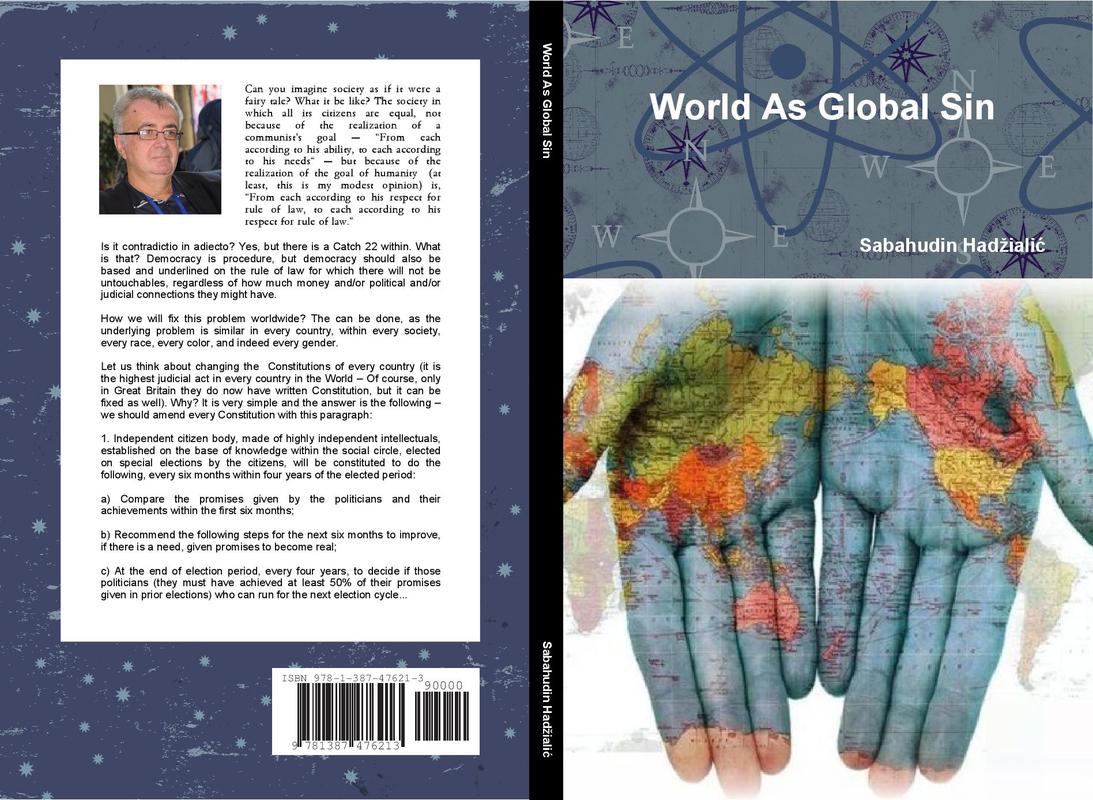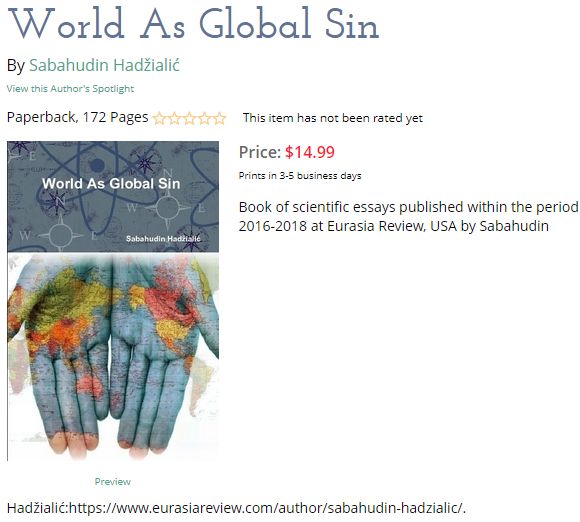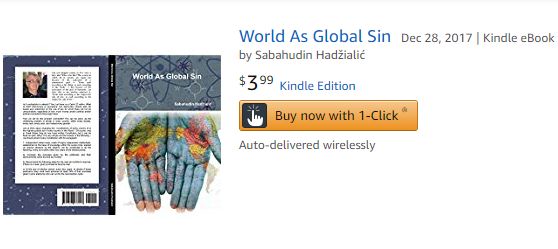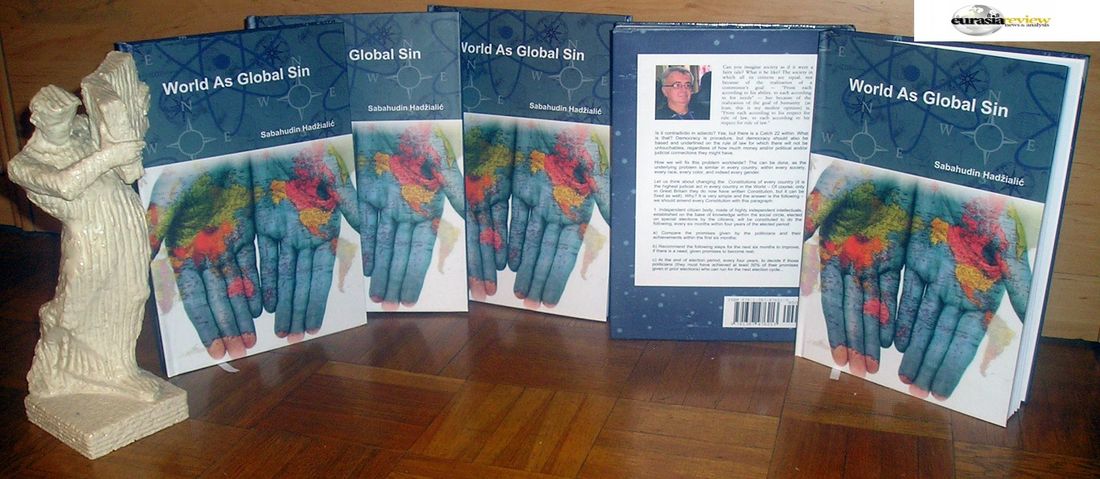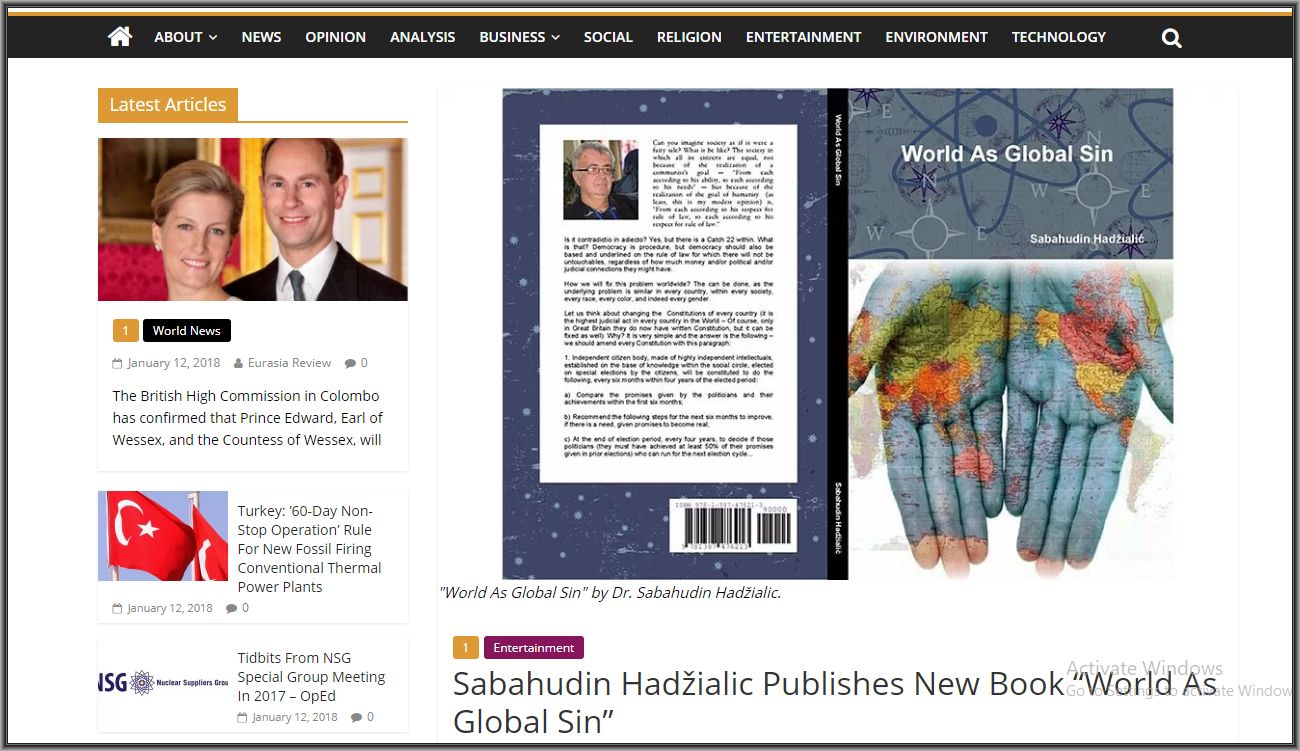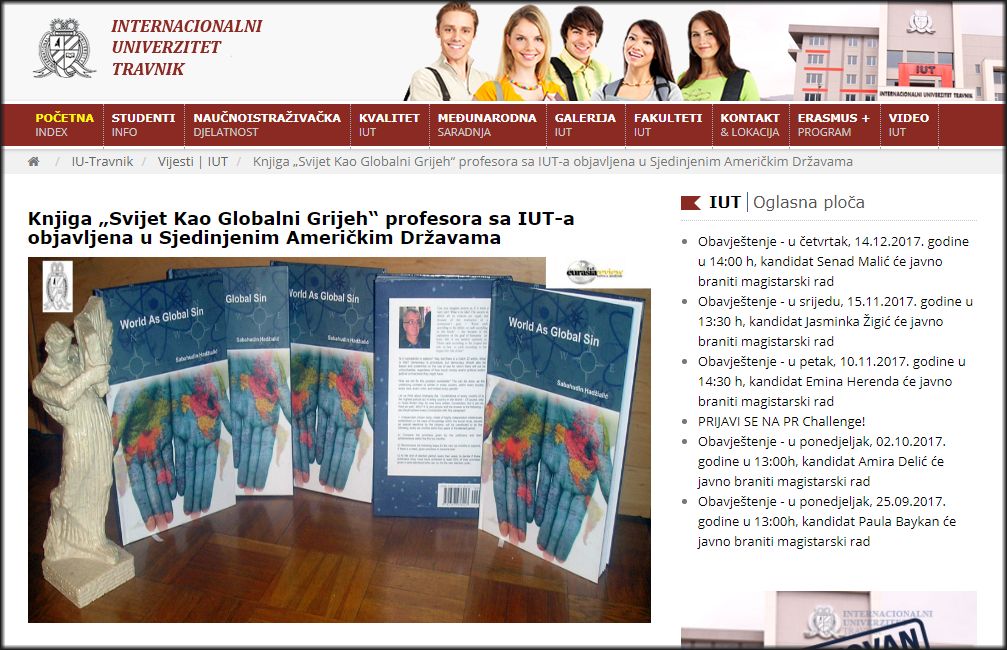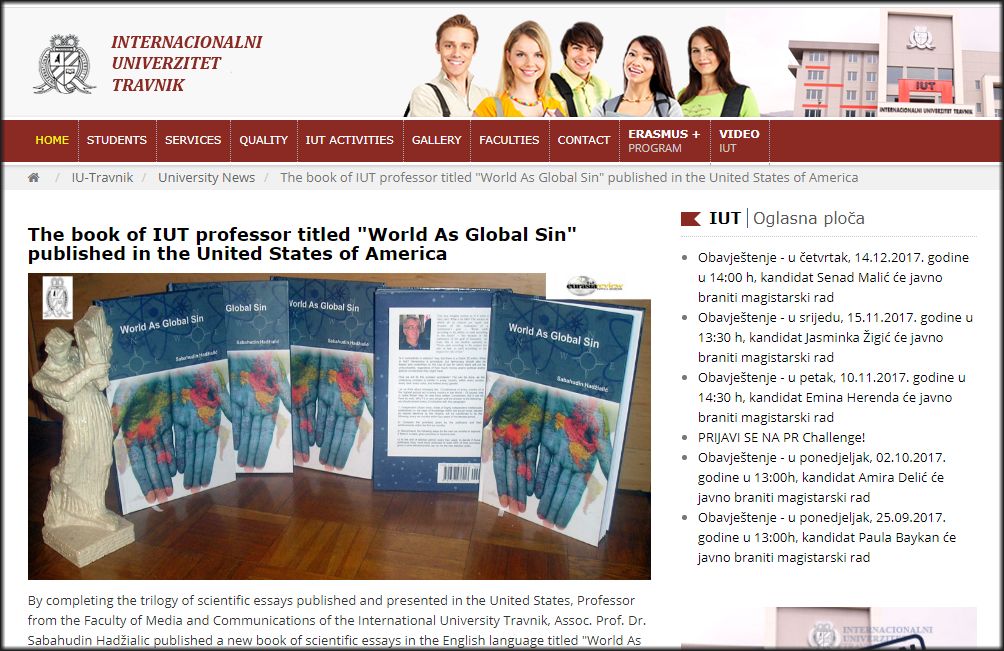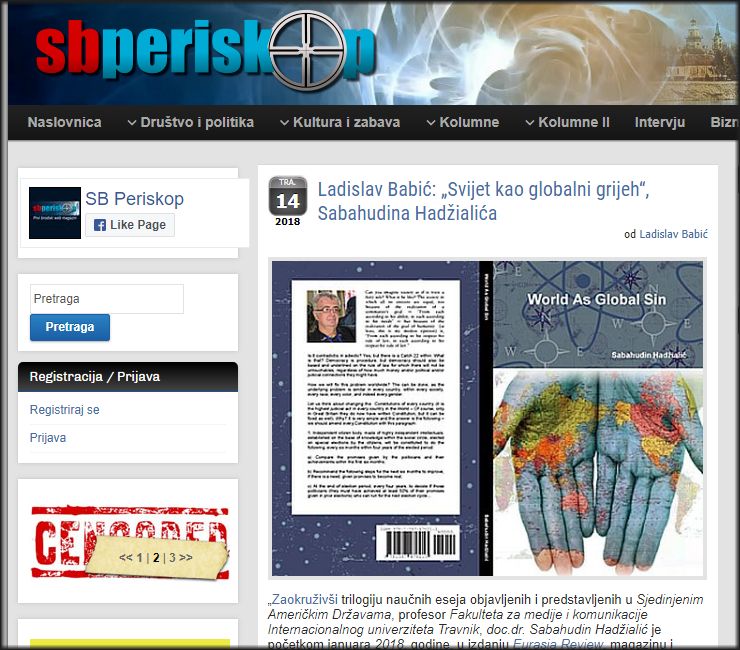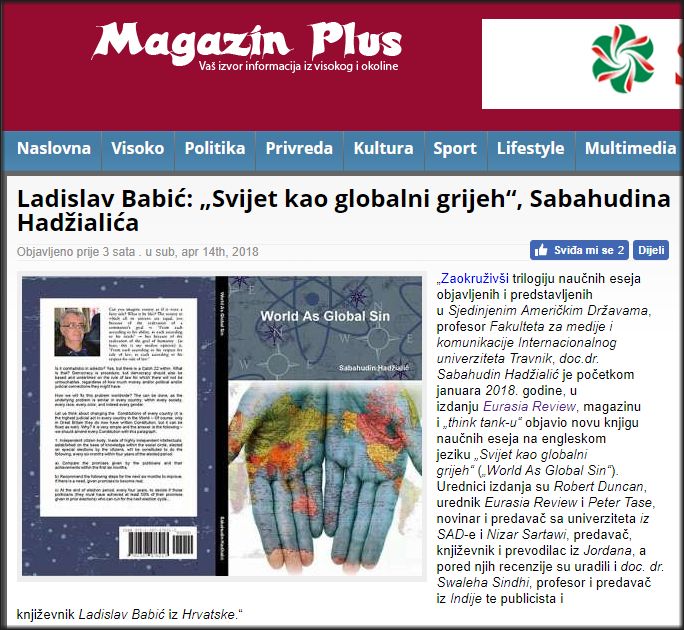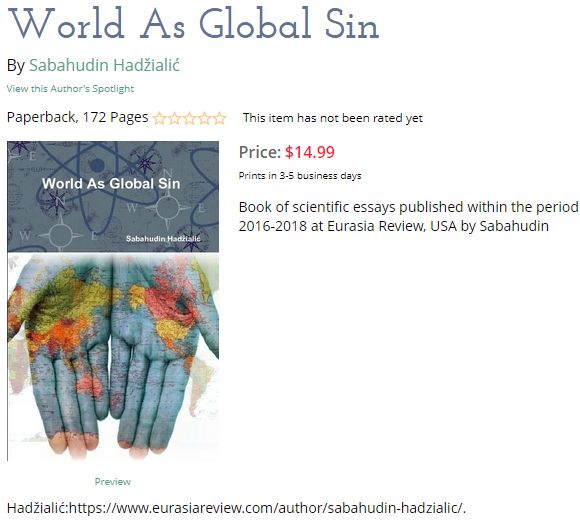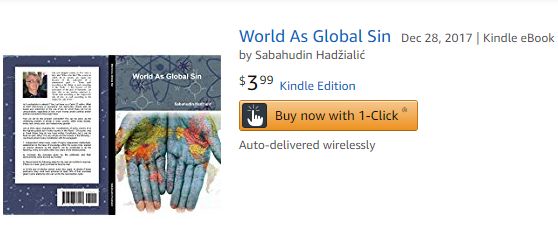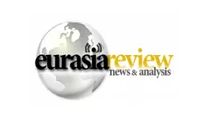January 2018
A new book of the scientific essays
"WORLD AS GLOBAL SIN"
Publisher: Eurasia Review, USA
Editors:
|
Book reviews:
|
Promotion in Bosnia and Herzegovina, 31.3.2018
Channel 6 TV from Travnik, BiH
Promotion of two books - complete video recording by
DIOGEN pro culture, magazine for art, culture, education and science
31.3.2018
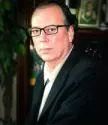
Foreword by Robert Duncan
A Tortured Call For Peace
You are holding here in your hands the tortured call of a poet who is screaming at the world to stop its march to destruction.
But is anybody listening?
Indeed, this is the great fear of Dr. Sabahudin Hadzialic … that nobody is listening. Instead, the world's populace appears content to be led by social media, populism or modern technology, without asking pertinent questions and implementing basic ethical guidelines. Drawing upon his experiences and insights having lived through the dissolution of the Former Yugoslavia, Dr. Sabahudin Hadzialic warns through parallels to current events of the dangers facing mankind – where the rule of the many, is lacking if it fails to consider the needs of the few, the underprivileged and those who are different from ourselves. In Dr. Sabahudin Hadzialic's ideal world, politicians are artists, women are empowered, journalists are ethical, religious leaders cordially exchange viewpoints, educators are concerned about teaching and not the spreading of propaganda, and business leaders are not just concerned about the bottom line.
But for any of that to happen, there must be honest conversation, where views can be exchanged without the fear of ridicule, and participants sit at the table of discourse.
Sound utopian? Sure, but then what is the danger of at least not dreaming?
Robert Duncan
Eurasia Review – Editor (www.eurasiareview.com)
22.12.2017, USA
A Tortured Call For Peace
You are holding here in your hands the tortured call of a poet who is screaming at the world to stop its march to destruction.
But is anybody listening?
Indeed, this is the great fear of Dr. Sabahudin Hadzialic … that nobody is listening. Instead, the world's populace appears content to be led by social media, populism or modern technology, without asking pertinent questions and implementing basic ethical guidelines. Drawing upon his experiences and insights having lived through the dissolution of the Former Yugoslavia, Dr. Sabahudin Hadzialic warns through parallels to current events of the dangers facing mankind – where the rule of the many, is lacking if it fails to consider the needs of the few, the underprivileged and those who are different from ourselves. In Dr. Sabahudin Hadzialic's ideal world, politicians are artists, women are empowered, journalists are ethical, religious leaders cordially exchange viewpoints, educators are concerned about teaching and not the spreading of propaganda, and business leaders are not just concerned about the bottom line.
But for any of that to happen, there must be honest conversation, where views can be exchanged without the fear of ridicule, and participants sit at the table of discourse.
Sound utopian? Sure, but then what is the danger of at least not dreaming?
Robert Duncan
Eurasia Review – Editor (www.eurasiareview.com)
22.12.2017, USA
Info on the Official page of Eurasia Review, USA
Info on the official IUT page in Joint language of South - East Europe (Bosnian, Croatian, Serbian and Montenegrin)

Book review by Peter Tase
Embracing an admirable propensity
Pierre Joseph Proudhon once stated: “Multiply your associations and be free;” in his new book World as Global Sin, Sabahudin Hadžialić writes: “Yes, you can call me a dreamer, but I am not the only one.'' Aspirations to become active in society and defending the basic civil rights, resurgence of philosophical conservatism, decentralization and voluntary association based on the principles of Tocqueville and Burke are some of these precise values that are embeded in Hadzialic's book, where his dreams are viable and certainly he is not alone. In World as Global Sin, Hadžialić maintains a clear posture towards Charles Darwin's web of life, Lucretius's “On the nature of things“ and of presocratic philosophers a few centuries earlier.
Under the framework of Aristotelian natural order and its different divisions, Sabahudin Hadžialić has examined to a great detail the realities of world politics, current events in Bosnia and Herzegovina, democratic institutions in Sarajevo, suggesting constitutional amendments that are worth taking into account in the Balkans and beyond.
Just like the ancient Greeks; Hadžialić is in constant search for the improvement of public service, democratic institutions and management of public media through intense reasoning, observations, comparison of statecraft models, criticism and his deep interest focused towards creating forms of relationship among human beings that would be more in accordance to their original state, before accident or human evil had intervened and altered them, therefore, public service and attitude would be purer in quality and truer to the actual nature of man.
In his book, Hadžialić states: “At the end of election period, every four years, to decide if those politicians (there has to be achieved at least 50 % of promises given prior to elections) can go for the next election term.
Primitivism, hypocrisy, and ignorance with the acronym PHI should be written at the entrance of every country’s border around the world until we implement the above-mentioned Amendment. How [will] that Amendment to the Constitution change and make the economy better. Simple as it is: The economy is deeply connected with politics, and when politicians understand that they are here to serve the people instead of vice versa, economy will bloom.”
In his analysis, Hadžialić is pursuing a powerful conviction that transcends from Saint Benedict’s monasticism and utopianism down to the philosophy of anarchism; a significant argument that reveals phenomena as described by Robert Nisbet; “where the larger society suffers from forces which have corrupted its true character, its nature, and that it is important for human beings to renew nature by forming communities free from the corruptions and degenerations of the larger society. These communities would be, in their structures, processes, and the demands they made upon individual members, in accord with what had once been, what ought to be, and what could be.”
In the book of Sabahudin Hadžialić we observe a great sense of conviction, outstanding public service, patriotism and the drive to construct a pluralist community in the west. The author strives to play a key role towards the strengthening of the philosophy of pluralism at a time when Prof. Nisbet states that immense, centralized, nationalistic structures of power and economy are the political orders of our age. The ideas of decentralization, elaborated by Sabahudin Hadžialić, have acquired an increased attention by scholars and intellectuals, who have also focused their research towards regionalism, localism and voluntary autonomous association. These are the very same ideas articulated by Tocqueville and other pluralists, therefore generating a high level of appreciation for these philosophers.
I am confident that Sabahudin Hadzialic’s book is contributing towards reducing the centralization of power, collectivism, and bureaucratization of functions in urban and intellectual circles, an engagement of positive outcomes that are necessary to democratic institutions. On the other hand, as Prof. Nisbet articulates in his major work, “it would seem exceedingly unlikely that the huge monoliths of military-political-revolutionary power we see abroad, all set deeply in the traditions of community we have examined in this book, will very soon cease to exist.”
In addition to his arguments on morality and utopian tradition, initiated by Sir Thomas More, Hadžialić states:
1. 2017 might be a new light for the World – only if liberal, conscious and open and free-minded people of all ethnicities, race and/or gender and/or age, using Social Media rise up and establish a new consciousness of the World, respecting their differences among us as our advantages for the benefit of all.
2. The goal is the survival of the World, but not for the benefit of a few.
3. The tool for that is our consciousness in connection with the ultimate objective that we are humans in the first place, and after that everything else.”
With these suggestions Sabahudin Hadžialić outlines a social development through the development of knowledge of new cultures and the establishment of greater cultural competencies for the benefit of all.
World as Global Sin embraces an admirable propensity where historical contributions are made in the discovery and reliance upon simple, genuine and untrammeled cooperation, love among human beings that ensures renewal of energies and constant changes on statecraft, government leadership, transparency, effective administration and eliminates coercion in all of its appearances.
Embracing an admirable propensity
Pierre Joseph Proudhon once stated: “Multiply your associations and be free;” in his new book World as Global Sin, Sabahudin Hadžialić writes: “Yes, you can call me a dreamer, but I am not the only one.'' Aspirations to become active in society and defending the basic civil rights, resurgence of philosophical conservatism, decentralization and voluntary association based on the principles of Tocqueville and Burke are some of these precise values that are embeded in Hadzialic's book, where his dreams are viable and certainly he is not alone. In World as Global Sin, Hadžialić maintains a clear posture towards Charles Darwin's web of life, Lucretius's “On the nature of things“ and of presocratic philosophers a few centuries earlier.
Under the framework of Aristotelian natural order and its different divisions, Sabahudin Hadžialić has examined to a great detail the realities of world politics, current events in Bosnia and Herzegovina, democratic institutions in Sarajevo, suggesting constitutional amendments that are worth taking into account in the Balkans and beyond.
Just like the ancient Greeks; Hadžialić is in constant search for the improvement of public service, democratic institutions and management of public media through intense reasoning, observations, comparison of statecraft models, criticism and his deep interest focused towards creating forms of relationship among human beings that would be more in accordance to their original state, before accident or human evil had intervened and altered them, therefore, public service and attitude would be purer in quality and truer to the actual nature of man.
In his book, Hadžialić states: “At the end of election period, every four years, to decide if those politicians (there has to be achieved at least 50 % of promises given prior to elections) can go for the next election term.
Primitivism, hypocrisy, and ignorance with the acronym PHI should be written at the entrance of every country’s border around the world until we implement the above-mentioned Amendment. How [will] that Amendment to the Constitution change and make the economy better. Simple as it is: The economy is deeply connected with politics, and when politicians understand that they are here to serve the people instead of vice versa, economy will bloom.”
In his analysis, Hadžialić is pursuing a powerful conviction that transcends from Saint Benedict’s monasticism and utopianism down to the philosophy of anarchism; a significant argument that reveals phenomena as described by Robert Nisbet; “where the larger society suffers from forces which have corrupted its true character, its nature, and that it is important for human beings to renew nature by forming communities free from the corruptions and degenerations of the larger society. These communities would be, in their structures, processes, and the demands they made upon individual members, in accord with what had once been, what ought to be, and what could be.”
In the book of Sabahudin Hadžialić we observe a great sense of conviction, outstanding public service, patriotism and the drive to construct a pluralist community in the west. The author strives to play a key role towards the strengthening of the philosophy of pluralism at a time when Prof. Nisbet states that immense, centralized, nationalistic structures of power and economy are the political orders of our age. The ideas of decentralization, elaborated by Sabahudin Hadžialić, have acquired an increased attention by scholars and intellectuals, who have also focused their research towards regionalism, localism and voluntary autonomous association. These are the very same ideas articulated by Tocqueville and other pluralists, therefore generating a high level of appreciation for these philosophers.
I am confident that Sabahudin Hadzialic’s book is contributing towards reducing the centralization of power, collectivism, and bureaucratization of functions in urban and intellectual circles, an engagement of positive outcomes that are necessary to democratic institutions. On the other hand, as Prof. Nisbet articulates in his major work, “it would seem exceedingly unlikely that the huge monoliths of military-political-revolutionary power we see abroad, all set deeply in the traditions of community we have examined in this book, will very soon cease to exist.”
In addition to his arguments on morality and utopian tradition, initiated by Sir Thomas More, Hadžialić states:
1. 2017 might be a new light for the World – only if liberal, conscious and open and free-minded people of all ethnicities, race and/or gender and/or age, using Social Media rise up and establish a new consciousness of the World, respecting their differences among us as our advantages for the benefit of all.
2. The goal is the survival of the World, but not for the benefit of a few.
3. The tool for that is our consciousness in connection with the ultimate objective that we are humans in the first place, and after that everything else.”
With these suggestions Sabahudin Hadžialić outlines a social development through the development of knowledge of new cultures and the establishment of greater cultural competencies for the benefit of all.
World as Global Sin embraces an admirable propensity where historical contributions are made in the discovery and reliance upon simple, genuine and untrammeled cooperation, love among human beings that ensures renewal of energies and constant changes on statecraft, government leadership, transparency, effective administration and eliminates coercion in all of its appearances.
Info on the official IUT page in English language

Book review by Dr. Swaleha Sindhi
If we count on those humans who are in power,
we will never reach a point of agreement
The book World as Global Sin is a good read for those who love to read on the current happenings in politics, religion and society. Sabahudin Hadzialic - scholar, writer, poet, editor, and freelance journalist has made a good attempt to bring together his essays on politics and society in the form of a book. The author has raised various issues facing the contemporary world politics, religion and society, how the nations in the world have misused freedom for corruption, at the cost of interest of the citizens. He begins his concern for the contemporary society by raising a question if we can imagine a society in which all its citizens are equal, not because of the realization of a communist’s goal — “From each according to his ability, to each according to his needs.” He very well points on the rising populism as a cause of recent terrorism in the world, and how societies of the world should establish cordial relation that will give full and devoted respect for those who are different, and establish a world of mutual trust.
Questioning the practice of Western democracy in many countries in the world, the author points out on starvation, conflict and lethal diseases and stresses the need for dialogue on these issues occurring around the world. He writes about the concern on the rising nationalism leading the world into a new big war and hints at respect of cultural diversity and strengthening of the role of United Nation as a real watch dog. According to him Globalization is a mixed blessing, as a continuation of modernization, though the critics view globalization as undermining democracy, cultural homogenization and increased destruction of the natural environment and species on the planet Earth. He is questioning the future for humanity, as 70% of the countries worldwide are into feudalism, where people are treated like livestock; they are there to earn the money and goods, not for themselves, but for their owners. He is of the view that human beings have to go empty-handed back to the Almighty; so it is religion that is the only savior, and deliberative democracy as the only way out. In the author’s view there may be differences among people of the nations; but one similarity among them is that all of them have red blood running under their skins. He raises a concern: Does humanity exist as a global sin because of non-democratic societies?
And he asserts that for making a society where all the citizens are equal, there must be a change in the constitution of every country, or at least an amendment in every constitution with one paragraph; recommending the elected politicians to disseminate their duties and be accountable to improve in the next six months if there is a need, given promises to become real. His concern for society is seen when he writes that we are on the edge of civilization; as poverty is not any more just poverty for the need for food. On the role played by Art for solving problems of humanity, the author has the opinion that the language of art unifies the social and political diversities. He asserts that the new order must create education system that will be devoted to skills and critical thinking, communicating hope and trust in the contemporary times. There are still Croats, Serbs and Bosniaks who wish to live together. To give them a possibility of creating a joint teaching program for schools and to “awake the memories” of living together are challenges for future generations.
On discussing the function of media in the democratic societies, his opinion is that the social media and social innovation are a two-way street, because innovating a society through social media and vice versa is a never-ending story. For him ethics is inseparable from journalism, because the practice of journalism is centered on a set of essentially ethical concepts: freedom, democracy, truth, objectivity, honesty and privacy. The major issue according to him is maintaining the quality of information for a journalist, as this issue has become a matter of political controversy and public concern. Ethical decisions are always made within a certain particular context that includes political, social and cultural climate, the factors of the context, very often, are creating an internal morality conflict of the stances of our conscience about what we should do and what is popular to be done. Finally, he points out on society by stating that if we count on those humans who are in power, we will never reach a point of agreement; but the leaders of the main religions can finally, and ultimately, reach a consensus, because if we destroy ourselves within the meaningless wars that are going on; who will stay behind and BELIEVE? Because depopulation will not stop for just a certain, wished, number of people. Depopulation will become a never-ending story for all of us.
If we count on those humans who are in power,
we will never reach a point of agreement
The book World as Global Sin is a good read for those who love to read on the current happenings in politics, religion and society. Sabahudin Hadzialic - scholar, writer, poet, editor, and freelance journalist has made a good attempt to bring together his essays on politics and society in the form of a book. The author has raised various issues facing the contemporary world politics, religion and society, how the nations in the world have misused freedom for corruption, at the cost of interest of the citizens. He begins his concern for the contemporary society by raising a question if we can imagine a society in which all its citizens are equal, not because of the realization of a communist’s goal — “From each according to his ability, to each according to his needs.” He very well points on the rising populism as a cause of recent terrorism in the world, and how societies of the world should establish cordial relation that will give full and devoted respect for those who are different, and establish a world of mutual trust.
Questioning the practice of Western democracy in many countries in the world, the author points out on starvation, conflict and lethal diseases and stresses the need for dialogue on these issues occurring around the world. He writes about the concern on the rising nationalism leading the world into a new big war and hints at respect of cultural diversity and strengthening of the role of United Nation as a real watch dog. According to him Globalization is a mixed blessing, as a continuation of modernization, though the critics view globalization as undermining democracy, cultural homogenization and increased destruction of the natural environment and species on the planet Earth. He is questioning the future for humanity, as 70% of the countries worldwide are into feudalism, where people are treated like livestock; they are there to earn the money and goods, not for themselves, but for their owners. He is of the view that human beings have to go empty-handed back to the Almighty; so it is religion that is the only savior, and deliberative democracy as the only way out. In the author’s view there may be differences among people of the nations; but one similarity among them is that all of them have red blood running under their skins. He raises a concern: Does humanity exist as a global sin because of non-democratic societies?
And he asserts that for making a society where all the citizens are equal, there must be a change in the constitution of every country, or at least an amendment in every constitution with one paragraph; recommending the elected politicians to disseminate their duties and be accountable to improve in the next six months if there is a need, given promises to become real. His concern for society is seen when he writes that we are on the edge of civilization; as poverty is not any more just poverty for the need for food. On the role played by Art for solving problems of humanity, the author has the opinion that the language of art unifies the social and political diversities. He asserts that the new order must create education system that will be devoted to skills and critical thinking, communicating hope and trust in the contemporary times. There are still Croats, Serbs and Bosniaks who wish to live together. To give them a possibility of creating a joint teaching program for schools and to “awake the memories” of living together are challenges for future generations.
On discussing the function of media in the democratic societies, his opinion is that the social media and social innovation are a two-way street, because innovating a society through social media and vice versa is a never-ending story. For him ethics is inseparable from journalism, because the practice of journalism is centered on a set of essentially ethical concepts: freedom, democracy, truth, objectivity, honesty and privacy. The major issue according to him is maintaining the quality of information for a journalist, as this issue has become a matter of political controversy and public concern. Ethical decisions are always made within a certain particular context that includes political, social and cultural climate, the factors of the context, very often, are creating an internal morality conflict of the stances of our conscience about what we should do and what is popular to be done. Finally, he points out on society by stating that if we count on those humans who are in power, we will never reach a point of agreement; but the leaders of the main religions can finally, and ultimately, reach a consensus, because if we destroy ourselves within the meaningless wars that are going on; who will stay behind and BELIEVE? Because depopulation will not stop for just a certain, wished, number of people. Depopulation will become a never-ending story for all of us.
14.4.2018 - Prikaz knjige "Svijet kao globalni grijeh" ("World As Global Sin", Eurasia Review, January 2018) iz pera Ladislava Babića - Hrvatska (SBPeriskop, gl. i odg. urednik Veljko Lukić): http://www.sbperiskop.net/glavna-vijest/ladislav-babic-svijet-kao-globalni-grijeh-sabahudina-hadzialica
Prikaz knjige "Svijet kao globalni grijeh" ("World As Global Sin", Eurasia Review, January 2018) iz pera Ladislava Babića - Bosna i Hercegovina (Magazin Plus, vl. Midhat Hajdarević): http://www.magazinplus.eu/ladislav-babic-svijet-kao-globalni-grijeh-sabahudina-hadzialica/

Book review by Ladislav Babić
Shaking out, in front of the sheep
The author of the book, Mr. Sabahudin Hadžialic, I know – as well as his views – for years, since I collaborate within his internet and print projects, and also by following his considerations in the essays that are collected in the book. The title of the book World as Global Sin reminds me irresistibly of the biblical “ancient sin” of our ancestors, which looks like it has been conveyed to us, who knows in which ways and in what paths (the "scientific" explanation would include genetics. but personally - though I accept the scientific view of the world – I am quite reserved with regard to such a view). However, this alleged sin /ancient sin - whatever we call it - always slams on the surface of the consciousness of thinking people. The most recent example is the Israeli ambassador's argument, which, by showing of the coin, of thousands and thousands of years, wants to reserve exclusively Israeli right on Jerusalem as its capital - the confluence of the three largest monogamous religions (through the developmental sequence originated one from each other) - not seeing that such policies only intensify anti-Semitic outbreaks all over the world, because the Jews were almost out of the face of the planet in the recent past. Perhaps, by a similar method, I could, with deep apologies from my side - by showing my own genitals - to prove directly my origin that goes back to Adam and Eve (the "divine creations"), demanding the right of billions of world's inhabitants - a huge percentage of exploited by well-constructed but ethically miserable minority - to set up their own order, not only in the countries of the world, but also on the planet as a whole.
The right to express one's own opinion is one of the elements of democracy (I would say, those political) which by no means exhausts its meaning, so that the "rulers of the world" - an economic establishment whose attitudes and interests the governments are mostly direct transmitters to reality - want to persuade. Because, apart from the demand for these considerations to be taken seriously, there are two more pillars of true democracy, which in any country of the world are not properly absorbed - social, and especially economic democracy. My modest opinion should also include its global component, because in a rigid environment and in the practice of very active engagement by some of the great powers, it is hardly possible to realize the democratic idea of the longer term in any country. Many states (and especially some) that are proud of a democratic aura and as such pose a "lighthouse" to many of their satellites - and to be a satellite in the political sense means to be deprived of their attitudes, especially their implementation in reality - they are not, in any case, what a real democracy is "obsessed" with the obsequiousness of humanism. Humanism is missing where, because of the intervention of quasi-democracy into the internal affairs of others, by following exclusively their own economic interest, which is masked by the call for human rights and their interpretation - platitudes, on a daily basis dies up to thousands of innocent human beings (not talking about destroying infrastructure. Consequently, these countries are addicted to the aggressor as well as to the historical monuments that speak of the high culture of those countries where irony was formed by the "culture" of the aggressor, which by doing so destroys its own roots), even without a human response to their destiny among the vast part of the population of aggressor states.
And the author of the book, as well as myself, are coming from the state which was far beyond being democratic (ex-Yugoslavia - in the sense of the previous explanation); but it has certainly initiated theoretically and practically some of the worldviews that neither from the east nor from the west should be neglected. Unfortunately, not only did this country break into the bloody combination of civil wars and aggression by its constituencies, but the whole world was heading in a completely different direction, but were the most optimistic (most naïve?) expected after the demolition of the Berlin Wall and the collapse of the rigid version of socialism, so-called "real socialism". Knowing Mr. Hadžialic's take-up for the real democracy and suggestions publicly published with his texts gathered in this book, I cannot help but stand behind them, hoping for optimism at the same time (The Hope no one has yet found on the bottom of Pandora's bag), and simultaneously even prevailing pessimism, seeing how much and how our species learns from history. Historians, philosophers and sociologists perceive differently the role of an individual in history, whether we consider historical experiences, can be both positive and negative, but unfortunately, almost always paid by human lives. The masses, the vast majority of the world's citizens, are mostly figured as a means of achieving the goals of the establishment or the antique choir that a posteriorly comments on the events, and we must be aware that an individual is always presenting the supreme exponent of the minorities occupied for its own interests.
Evolution, both biological and social, as one of its upgrades, does not encompass all people in the same qualitative dimension. Unfortunately, the world is still - and cannot be expected to change soon - somewhere in the stage of development between its primate ancestors and the primeval, from the world's greatest ethicists of the era of a contemplative Man who has managed to eradicate his limitations, alienation from the potential, almost divine abilities. From my own experience, as well as from the experience of the author of the book, which has unambiguously led to reflection in the essays collected in the book, I know that the vast minority of members of different world societies from different civilizations nurtures an original, humanistic view of human society, and very often because of that being excommunicated to different (even deadly) ways out of public life. Taking such a burden requires courage and spiritual strength, as well as human dignity, which, undoubtedly Mr Sabahudin Hadžialic has within his disposition. What does the cry of "thirsty in the desert" mean; can he change his own as well as the destiny of the whole human race? Although, without that cry it would have meant in advance the surrender to the forces of darkness, merging with the unworthy. Munchy's desperate cry from the author of the book, World as Global Sin, no matter what his real echo is in the wider public, is certainly an attempt by the individual who understands where he is from, which has extracted not only limited experience, since he was never closed into the spiritual districts to which the majority is still slave to, unable to critically re-examine their axioms, but to see the state of the whole - the world that is basically our only true homeland - and boldly outlines its views. When an idea is put in public once, it becomes independent of the author. Whether it will or will not be accepted, it no longer depends on him. Mr. Hadžialic is shaking out, in front of the sheep that follow his shepherds, spiritual food; whether they will consume and "metabolically" turn into a better future for all of us is no longer dependent on the author. They say that Jesus turned water into wine; the masses remain - without the help of the Lord - to bring even greater miracles. By transforming the sheep into the right people, building the future as the most humane species representatives have for millennia vainly present to their neighbors. Sabahudin Hadžialic, certainly belongs among those.
Shaking out, in front of the sheep
The author of the book, Mr. Sabahudin Hadžialic, I know – as well as his views – for years, since I collaborate within his internet and print projects, and also by following his considerations in the essays that are collected in the book. The title of the book World as Global Sin reminds me irresistibly of the biblical “ancient sin” of our ancestors, which looks like it has been conveyed to us, who knows in which ways and in what paths (the "scientific" explanation would include genetics. but personally - though I accept the scientific view of the world – I am quite reserved with regard to such a view). However, this alleged sin /ancient sin - whatever we call it - always slams on the surface of the consciousness of thinking people. The most recent example is the Israeli ambassador's argument, which, by showing of the coin, of thousands and thousands of years, wants to reserve exclusively Israeli right on Jerusalem as its capital - the confluence of the three largest monogamous religions (through the developmental sequence originated one from each other) - not seeing that such policies only intensify anti-Semitic outbreaks all over the world, because the Jews were almost out of the face of the planet in the recent past. Perhaps, by a similar method, I could, with deep apologies from my side - by showing my own genitals - to prove directly my origin that goes back to Adam and Eve (the "divine creations"), demanding the right of billions of world's inhabitants - a huge percentage of exploited by well-constructed but ethically miserable minority - to set up their own order, not only in the countries of the world, but also on the planet as a whole.
The right to express one's own opinion is one of the elements of democracy (I would say, those political) which by no means exhausts its meaning, so that the "rulers of the world" - an economic establishment whose attitudes and interests the governments are mostly direct transmitters to reality - want to persuade. Because, apart from the demand for these considerations to be taken seriously, there are two more pillars of true democracy, which in any country of the world are not properly absorbed - social, and especially economic democracy. My modest opinion should also include its global component, because in a rigid environment and in the practice of very active engagement by some of the great powers, it is hardly possible to realize the democratic idea of the longer term in any country. Many states (and especially some) that are proud of a democratic aura and as such pose a "lighthouse" to many of their satellites - and to be a satellite in the political sense means to be deprived of their attitudes, especially their implementation in reality - they are not, in any case, what a real democracy is "obsessed" with the obsequiousness of humanism. Humanism is missing where, because of the intervention of quasi-democracy into the internal affairs of others, by following exclusively their own economic interest, which is masked by the call for human rights and their interpretation - platitudes, on a daily basis dies up to thousands of innocent human beings (not talking about destroying infrastructure. Consequently, these countries are addicted to the aggressor as well as to the historical monuments that speak of the high culture of those countries where irony was formed by the "culture" of the aggressor, which by doing so destroys its own roots), even without a human response to their destiny among the vast part of the population of aggressor states.
And the author of the book, as well as myself, are coming from the state which was far beyond being democratic (ex-Yugoslavia - in the sense of the previous explanation); but it has certainly initiated theoretically and practically some of the worldviews that neither from the east nor from the west should be neglected. Unfortunately, not only did this country break into the bloody combination of civil wars and aggression by its constituencies, but the whole world was heading in a completely different direction, but were the most optimistic (most naïve?) expected after the demolition of the Berlin Wall and the collapse of the rigid version of socialism, so-called "real socialism". Knowing Mr. Hadžialic's take-up for the real democracy and suggestions publicly published with his texts gathered in this book, I cannot help but stand behind them, hoping for optimism at the same time (The Hope no one has yet found on the bottom of Pandora's bag), and simultaneously even prevailing pessimism, seeing how much and how our species learns from history. Historians, philosophers and sociologists perceive differently the role of an individual in history, whether we consider historical experiences, can be both positive and negative, but unfortunately, almost always paid by human lives. The masses, the vast majority of the world's citizens, are mostly figured as a means of achieving the goals of the establishment or the antique choir that a posteriorly comments on the events, and we must be aware that an individual is always presenting the supreme exponent of the minorities occupied for its own interests.
Evolution, both biological and social, as one of its upgrades, does not encompass all people in the same qualitative dimension. Unfortunately, the world is still - and cannot be expected to change soon - somewhere in the stage of development between its primate ancestors and the primeval, from the world's greatest ethicists of the era of a contemplative Man who has managed to eradicate his limitations, alienation from the potential, almost divine abilities. From my own experience, as well as from the experience of the author of the book, which has unambiguously led to reflection in the essays collected in the book, I know that the vast minority of members of different world societies from different civilizations nurtures an original, humanistic view of human society, and very often because of that being excommunicated to different (even deadly) ways out of public life. Taking such a burden requires courage and spiritual strength, as well as human dignity, which, undoubtedly Mr Sabahudin Hadžialic has within his disposition. What does the cry of "thirsty in the desert" mean; can he change his own as well as the destiny of the whole human race? Although, without that cry it would have meant in advance the surrender to the forces of darkness, merging with the unworthy. Munchy's desperate cry from the author of the book, World as Global Sin, no matter what his real echo is in the wider public, is certainly an attempt by the individual who understands where he is from, which has extracted not only limited experience, since he was never closed into the spiritual districts to which the majority is still slave to, unable to critically re-examine their axioms, but to see the state of the whole - the world that is basically our only true homeland - and boldly outlines its views. When an idea is put in public once, it becomes independent of the author. Whether it will or will not be accepted, it no longer depends on him. Mr. Hadžialic is shaking out, in front of the sheep that follow his shepherds, spiritual food; whether they will consume and "metabolically" turn into a better future for all of us is no longer dependent on the author. They say that Jesus turned water into wine; the masses remain - without the help of the Lord - to bring even greater miracles. By transforming the sheep into the right people, building the future as the most humane species representatives have for millennia vainly present to their neighbors. Sabahudin Hadžialic, certainly belongs among those.
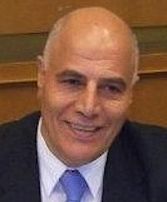
Book review by Nizar Sartawi
Hadzialic’s World As Global Sin:
A Torch Amidst The Darkness
The last three centuries, which constitute the late modern history, witnessed two major revolutions that have changed our world dramatically: the industrial revolution and the knowledge revolution. The former, which began around the middle of the 17th century, marked a transition to manufacturing processes that broke away from the dominance of agriculture. The latter, probably still at its beginning, is characterized by a fast-paced technological advance that started in the last decade of the 20th century with the advent of the cyber-technology. Entering into our life softly, yet powerfully, this new comer has turned the world into a village. In theory, such advancement would lead to the improvement of people’s life by making it easier. However, contrary to expectations, it has been exploited by big enterprise owners and advocates of capitalism, who form only a very small percentage of the population of the earth. This has resulted in widening the gap between them and the rest of the world.
In response to this and other concerns and threats, Dr. Sabahudin Hadzialic has embarked on writing a series of scientific essays discussing issues that affect the lives of billions of people throughout the globe.
Hadzialic’s book, World As Global Sin, is a collection of 21 essays that have been published in the Eurasia Review, “an independent Journal and Think Tank that provides a venue for analysts and experts to disseminate content on a wide-range of subjects.” Hadzialic tackles these issues directly, with the robustness of a serious thinker and the experience of a prolific writer who has penned over 20 books of poetry and prose and a large number of essays that have earned international acclaim.
Hadzialic’s carefully selected title tellingly indicates the panoramic nature of the book: It takes a 360-degree view, addressing the world at large. Hadzialic believes that our globe, manipulated by a few selfish, powerful politicians and corporate entities who are only concerned about protecting and advancing their interests, is at great risk. Unless the current state of affairs is changed by planning and implementing rigorous and effective solutions, our world will continue marching to its doom, as he suggests in his essay, “Fading Of Civilization(s).”
In his discussion of our global maladies, Hadzialic maintains that nowadays many of the salient concepts that have acquired a universal publicity worldwide are being distorted. Expressions, such as democracy, freedom, religion, ethics, globalization, populism, terrorism, as well as many others, are becoming buzz words that are often misused, misinterpreted, or misdirected. They are deliberately employed by superpowers over and over again to serve hidden agendas. For Hadzialic, however, they are complicated, multi-faceted idioms that need to be redefined. One noteworthy example is democracy, a key word that occurs frequently throughout the book, and a concept that is linked with almost every subject that the author undertakes. According to Hadzialic, practicing democracy entails the prevalence of law. Law, however, cannot be enacted effectively unless there is equality among all people. For “nobody is free,” Hadzialic affirms, “if somebody’s democracy is violated.” Therefore, in a government where certain people are exempted from the law, democracy is meaningless; in a place where democracy is practiced on the basis of populism or under the aegis of “neo-liberalism” democracy is fake; in “an ethnically divided country,” democracy does not work; in a state where an elected ruler thinks he is free to act as he pleases, simply because he has been elected “democratically,” democracy is not much different from dictatorship; in a country that insists on imposing democracy on other nations across the globe by using military force, democracy is not acceptable.
Hadzialic, however, does not just criticize such practices, or rather malpractices. as a scientist, he proceeds methodologically, defining the problem, identifying the causes, explaining the consequences, and then proposing well-thought-out solutions. This is the approach he consistently uses in every single essay in this book.
For example, in his essay about terrorism, Hadzialic begins the first step, defining the problem. He rejects the allegation that terrorism is linked with religion, describing it as “non-intellectual and degrading.” Then he identifies the causes, contending that terrorism has emerged, among other reasons, as a result of creating “ghettos” and exporting both inadequate “democracy” and neo-liberalism to the states that are claimed to breed terrorism. Finally, he proposes a solution consisting of several steps whose purpose is to analyze and understand terrorism as it really is, and then suggests forming a “global organization that will fight against terrorism not on a basis of individual events in individual states, but on the basis of global events within all states.”
Hadzialic is distinguished from many other writers who treat similar subjects in more ways than one. First, he uses an analytical approach that moves logically from premises to conclusions. Secondly, his writing is characterized by an unusual clarity of vision. Thus, he communicates his ideas in a simple, step-by-step manner, leading his readers toward a common purpose. Moreover, he demonstrates both patience and persistence. Although each of his essays tackles a single topic, they all are directed towards a common goal, namely, effecting reform in our social, political and economic systems. It is worth noting that enduring values necessary to achieve this goal, such as freedom, democracy, ethics, and many more, keep recurring in his essays in various contexts. Similarly, his aversion to corruption, manipulation, cruelty, fundamentalism, chauvinism, and so on, is repeatedly voiced in his works.
More significantly, these qualities are fortified with a genuine humanitarian conviction. For Hadzialic’s writing springs from a deep concern for humanity, and an equally deep sense of ethical responsibility. Thus, in his essay “Media Ethics Essence Of Professional Journalism,” he emphasizes that ethics is neither “just a matter of codes of conduct” nor “a matter of rules to be followed,” but rather a matter of “principles concerning the rights and wrongs of human conduct, principles that ... can be applied objectively and impartially.” In this context, he lists six criteria that undserlie “any kind of ethical system,” namely, “freedom, democracy, truth, objectivity, honesty and privacy.”
Hadzialic deserves to have a chair among contemporary European social reformers. His World As Global Sin comes to assert this statement. The topics treated in the book have one thing in common; they are universal issues that we all need to come to grips with if we are truly concerned about our life, our environmemnt, our health, our economy, our freedom, our present and future, and the present and future of our children and grandchildren. As we read the book, we should take a look at our current life and ask ourselves whether it is the kind of life we aspire to have? If not, what should be done? And then we will know that the author has gifted us with a torch that can help us see things around us more clearly amidst the darkness prevaling in our world, and perhaps we will also realize that the time the author has invested in writing it and the time we invest in reading it has not been wasted.
Hadzialic’s World As Global Sin:
A Torch Amidst The Darkness
The last three centuries, which constitute the late modern history, witnessed two major revolutions that have changed our world dramatically: the industrial revolution and the knowledge revolution. The former, which began around the middle of the 17th century, marked a transition to manufacturing processes that broke away from the dominance of agriculture. The latter, probably still at its beginning, is characterized by a fast-paced technological advance that started in the last decade of the 20th century with the advent of the cyber-technology. Entering into our life softly, yet powerfully, this new comer has turned the world into a village. In theory, such advancement would lead to the improvement of people’s life by making it easier. However, contrary to expectations, it has been exploited by big enterprise owners and advocates of capitalism, who form only a very small percentage of the population of the earth. This has resulted in widening the gap between them and the rest of the world.
In response to this and other concerns and threats, Dr. Sabahudin Hadzialic has embarked on writing a series of scientific essays discussing issues that affect the lives of billions of people throughout the globe.
Hadzialic’s book, World As Global Sin, is a collection of 21 essays that have been published in the Eurasia Review, “an independent Journal and Think Tank that provides a venue for analysts and experts to disseminate content on a wide-range of subjects.” Hadzialic tackles these issues directly, with the robustness of a serious thinker and the experience of a prolific writer who has penned over 20 books of poetry and prose and a large number of essays that have earned international acclaim.
Hadzialic’s carefully selected title tellingly indicates the panoramic nature of the book: It takes a 360-degree view, addressing the world at large. Hadzialic believes that our globe, manipulated by a few selfish, powerful politicians and corporate entities who are only concerned about protecting and advancing their interests, is at great risk. Unless the current state of affairs is changed by planning and implementing rigorous and effective solutions, our world will continue marching to its doom, as he suggests in his essay, “Fading Of Civilization(s).”
In his discussion of our global maladies, Hadzialic maintains that nowadays many of the salient concepts that have acquired a universal publicity worldwide are being distorted. Expressions, such as democracy, freedom, religion, ethics, globalization, populism, terrorism, as well as many others, are becoming buzz words that are often misused, misinterpreted, or misdirected. They are deliberately employed by superpowers over and over again to serve hidden agendas. For Hadzialic, however, they are complicated, multi-faceted idioms that need to be redefined. One noteworthy example is democracy, a key word that occurs frequently throughout the book, and a concept that is linked with almost every subject that the author undertakes. According to Hadzialic, practicing democracy entails the prevalence of law. Law, however, cannot be enacted effectively unless there is equality among all people. For “nobody is free,” Hadzialic affirms, “if somebody’s democracy is violated.” Therefore, in a government where certain people are exempted from the law, democracy is meaningless; in a place where democracy is practiced on the basis of populism or under the aegis of “neo-liberalism” democracy is fake; in “an ethnically divided country,” democracy does not work; in a state where an elected ruler thinks he is free to act as he pleases, simply because he has been elected “democratically,” democracy is not much different from dictatorship; in a country that insists on imposing democracy on other nations across the globe by using military force, democracy is not acceptable.
Hadzialic, however, does not just criticize such practices, or rather malpractices. as a scientist, he proceeds methodologically, defining the problem, identifying the causes, explaining the consequences, and then proposing well-thought-out solutions. This is the approach he consistently uses in every single essay in this book.
For example, in his essay about terrorism, Hadzialic begins the first step, defining the problem. He rejects the allegation that terrorism is linked with religion, describing it as “non-intellectual and degrading.” Then he identifies the causes, contending that terrorism has emerged, among other reasons, as a result of creating “ghettos” and exporting both inadequate “democracy” and neo-liberalism to the states that are claimed to breed terrorism. Finally, he proposes a solution consisting of several steps whose purpose is to analyze and understand terrorism as it really is, and then suggests forming a “global organization that will fight against terrorism not on a basis of individual events in individual states, but on the basis of global events within all states.”
Hadzialic is distinguished from many other writers who treat similar subjects in more ways than one. First, he uses an analytical approach that moves logically from premises to conclusions. Secondly, his writing is characterized by an unusual clarity of vision. Thus, he communicates his ideas in a simple, step-by-step manner, leading his readers toward a common purpose. Moreover, he demonstrates both patience and persistence. Although each of his essays tackles a single topic, they all are directed towards a common goal, namely, effecting reform in our social, political and economic systems. It is worth noting that enduring values necessary to achieve this goal, such as freedom, democracy, ethics, and many more, keep recurring in his essays in various contexts. Similarly, his aversion to corruption, manipulation, cruelty, fundamentalism, chauvinism, and so on, is repeatedly voiced in his works.
More significantly, these qualities are fortified with a genuine humanitarian conviction. For Hadzialic’s writing springs from a deep concern for humanity, and an equally deep sense of ethical responsibility. Thus, in his essay “Media Ethics Essence Of Professional Journalism,” he emphasizes that ethics is neither “just a matter of codes of conduct” nor “a matter of rules to be followed,” but rather a matter of “principles concerning the rights and wrongs of human conduct, principles that ... can be applied objectively and impartially.” In this context, he lists six criteria that undserlie “any kind of ethical system,” namely, “freedom, democracy, truth, objectivity, honesty and privacy.”
Hadzialic deserves to have a chair among contemporary European social reformers. His World As Global Sin comes to assert this statement. The topics treated in the book have one thing in common; they are universal issues that we all need to come to grips with if we are truly concerned about our life, our environmemnt, our health, our economy, our freedom, our present and future, and the present and future of our children and grandchildren. As we read the book, we should take a look at our current life and ask ourselves whether it is the kind of life we aspire to have? If not, what should be done? And then we will know that the author has gifted us with a torch that can help us see things around us more clearly amidst the darkness prevaling in our world, and perhaps we will also realize that the time the author has invested in writing it and the time we invest in reading it has not been wasted.
Sabahudin Hadžialić, Grbavička 32, 71000 Sarajevo (i/ili Dr. Wagnera 18, 70230, Bugojno), Bosna i Hercegovina. Kontakt +387 63 111 052 i/ili [email protected]
|
Istaknuti samostalni umjetnik Rješenjem (Broj: 12-40-14384/16)
Ministra kulture i sporta Kantona Sarajevo od 19.2.2016. Istaknuti samostalni umjetnik od 1.1.2009 također odlukom nadležnog Ministarstva |
Prominent self sustained artist through Decision (No: 12-40-14384/16)
by the Minister of culture and sport of Canton Sarajevo since 19.2.2016. Prominentn self sustained artist as of 1.1.2009 also by the decision of authorized Ministry |
| registar_umjetnika_2017_juli.pdf | |
| File Size: | 116 kb |
| File Type: | |
